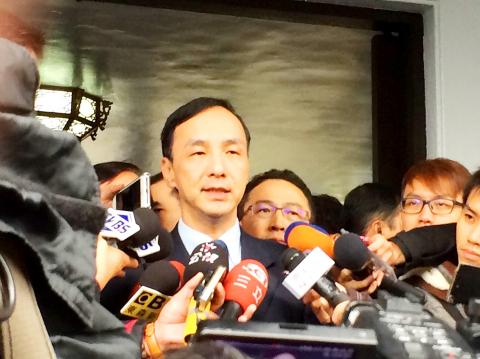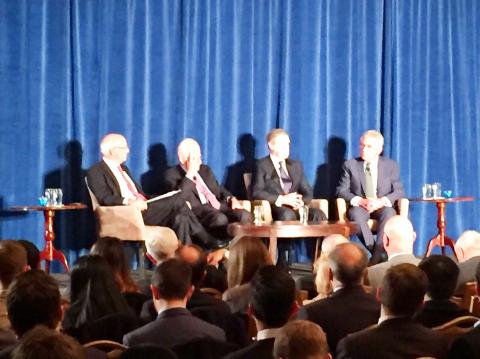The Chinese Nationalist Party (KMT) caucus said a Democratic Progressive Party (DPP) administration would lead to a breakdown of the nation’s diplomatic ties if it reverted to the diplomatic approach followed by the last DPP administration, citing a US forum in which four former US defense secretaries urged Taiwan not to reverse progress made on the cross-strait relationship.
KMT presidential campaign manager and former minister of foreign affairs Jason Hu (胡志強) said that in terms of scope, the forum, organized by the National Committee on United States-China Relations, was rarely seen.
“The [three] main points of the forum, in short, were: first, the size of the arms sales to Taiwan was limited, so there is no need for Beijing to worry; second, if the cross-strait relationship goes sour, it would be ‘mutually assured economic destruction;’ third, that cross-strait development has been on the right track in the past eight years, though there is still room for improvement,” Hu said.

Photo: Lee Jung-ping, Taipei Times
“If we told them at the forum that a major political party in Taiwan, according to what it had stated only days ago, does not rule out returning to scorched-earth diplomacy, that is, letting our diplomats know ‘who and what to fight for’ instead of following the current approach [of diplomatic truce], these defense secretaries would definitely not believe it,” Hu said.
Hu was referring to Democratic Progressive Party (DPP) presidential candidate Tsai Ing-wen’s (蔡英文) criticism of Ma’s “diplomatic truce” policy.
Tsai once said that the government’s diplomatic truce “has left many diplomats not knowing what they are fighting for and can only wait for someone to throw them a bone.”

Photo: CNA
A nation’s leader has to know that a nation’s policies are not separate from each other, such as that politics has nothing to do with the military, or that the military is unrelated to diplomacy, or that diplomacy has nothing to do with economy and trade, Hu said.
“Nor does it follow a linear model, in which military policies can wait until economic polices are done, and economic ones can wait until political affairs are settled,” Hu said.
“I think it is more tree-like. If the cross-strait relationship is good, it grows a lot of fruit. Some might be unripe, as a tree would always have some bad ones, but if [the cross-strait relationship] works well, the tree would have a good harvest overall,” Hu said, adding that diplomacy is an area where the achievements made in past years should be carefully maintained.
Former minister of foreign affairs Timothy Yang (楊進添) said he was “disheartened” when he heard that the diplomats were criticized as not knowing what they are fighting for, “for the nation’s diplomats have been assiduously working for the nation’s welfare.”
“‘Diplomatic truce’ has been called diplomatic coma, but it is not true. It is rather a tacit agreement with China to stop fighting over diplomatic allies. Only one ally, the Gambia, was lost during the Ma administration, and China was not the factor behind it,” he said.
“There are people saying it is okay for Taiwan to have zero diplomatic allies, but it should be emphasized that while we might consider ourselves a country, according to the international law you need recognition from other countries to be a country,” Yang added.
Citing an academic article, one reporter asked whether the KMT caucus’ warning of a possible “avalanche of cases of severances of diplomatic relations” amounts to intimidation and echoing Beijing’s stance.
Hu denied that it did and said it is the KMT’s right and every citizen’s right to express their concerns over Tsai’s diplomacy.
“It is extremely unfair to compare expression of a different view to intimidation,” Hu said.
Responding at a separate setting, DPP News and Information Department director Alex Huang (黃重諺) said that the Ministry of Foreign Affairs had already denied the KMT’s allegations.
“Regrettably, the KMT continues to play the threat card three days before the election, using diplomatic affairs as a tool of election manipulation,” Huang said. “The KMT is really not making any progress.”
In addition, responding to remarks made by former US defense secretaries at the forum, DPP spokesperson Wang Min-sheng (王閔生) said that maintaining cross-strait stability is a responsibility shared by both sides.
“Tsai will strive to maintain the ‘status quo’ to keep the Taiwan Strait peaceful,” he said.

DEMOGRAPHICS: Robotics is the most promising answer to looming labor woes, the long-term care system and national contingency response, an official said Taiwan is to launch a five-year plan to boost the robotics industry in a bid to address labor shortages stemming from a declining and aging population, the Executive Yuan said yesterday. The government approved the initiative, dubbed the Smart Robotics Industry Promotion Plan, via executive order, senior officials told a post-Cabinet meeting news conference in Taipei. Taiwan’s population decline would strain the economy and the nation’s ability to care for vulnerable and elderly people, said Peter Hong (洪樂文), who heads the National Science and Technology Council’s (NSTC) Department of Engineering and Technologies. Projections show that the proportion of Taiwanese 65 or older would

Nvidia Corp yesterday unveiled its new high-speed interconnect technology, NVLink Fusion, with Taiwanese application-specific IC (ASIC) designers Alchip Technologies Ltd (世芯) and MediaTek Inc (聯發科) among the first to adopt the technology to help build semi-custom artificial intelligence (AI) infrastructure for hyperscalers. Nvidia has opened its technology to outside users, as hyperscalers and cloud service providers are building their own cost-effective AI chips, or accelerators, used in AI servers by leveraging ASIC firms’ designing capabilities to reduce their dependence on Nvidia. Previously, NVLink technology was only available for Nvidia’s own AI platform. “NVLink Fusion opens Nvidia’s AI platform and rich ecosystem for

Taiwan Semiconductor Manufacturing Co (TSMC, 台積電) yesterday said it is building nine new advanced wafer manufacturing and packaging factories this year, accelerating its expansion amid strong demand for high-performance computing (HPC) and artificial intelligence (AI) applications. The chipmaker built on average five factories per year from 2021 to last year and three from 2017 to 2020, TSMC vice president of advanced technology and mask engineering T.S. Chang (張宗生) said at the company’s annual technology symposium in Hsinchu City. “We are quickening our pace even faster in 2025. We plan to build nine new factories, including eight wafer fabrication plants and one advanced

‘WORLD’S LOSS’: Taiwan’s exclusion robs the world of the benefits it could get from one of the foremost practitioners of disease prevention and public health, Minister Chiu said Taiwan should be allowed to join the World Health Assembly (WHA) as an irreplaceable contributor to global health and disease prevention efforts, Minister of Foreign Affairs Lin Chia-lung (林佳龍) said yesterday. He made the comment at a news conference in Taipei, hours before a Taiwanese delegation was to depart for Geneva, Switzerland, seeking to meet with foreign representatives for a bilateral meeting on the sidelines of the WHA, the WHO’s annual decisionmaking meeting, which would be held from Monday next week to May 27. As of yesterday, Taiwan had yet to receive an invitation. Taiwan has much to offer to the international community’s